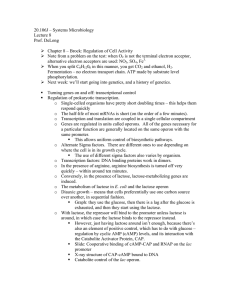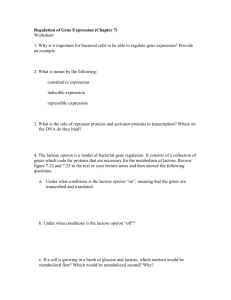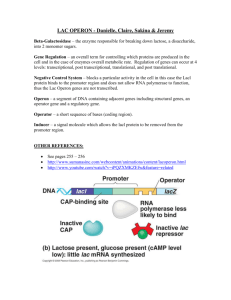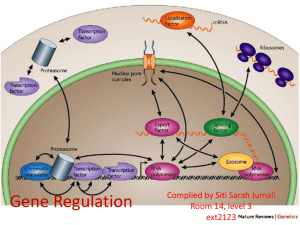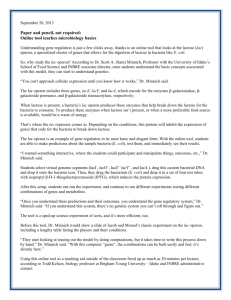Lecture #22 – 10/26 – Dr. Wormington
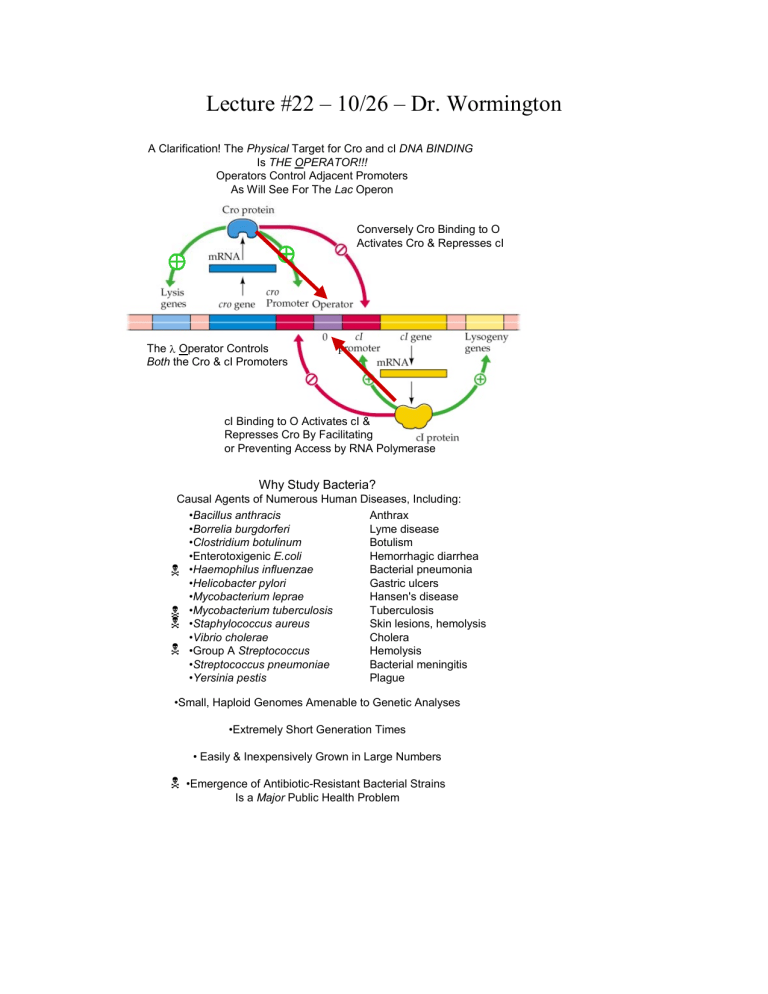
Lecture #22 – 10/26 – Dr. Wormington
A Clarification! The Physical Target for Cro and cI DNA BINDING
Is THE OPERATOR!!!
Operators Control Adjacent Promoters
As Will See For The Lac Operon
Conversely Cro Binding to O
Activates Cro & Represses cI
The λ Operator Controls
Both the Cro & cI Promoters cI Binding to O Activates cI &
Represses Cro By Facilitating or Preventing Access by RNA Polymerase
1
1
Why Study Bacteria?
Causal Agents of Numerous Human Diseases, Including:
• Bacillus anthracis
• Borrelia burgdorferi
• Clostridium botulinum
•Enterotoxigenic E.coli
• Haemophilus influenzae
• Helicobacter pylori
• Mycobacterium leprae
• Mycobacterium tuberculosis
• Staphylococcus aureus
• Vibrio cholerae
•Group A Streptococcus
• Streptococcus pneumoniae
• Yersinia pestis
Anthrax
Lyme disease
Botulism
Hemorrhagic diarrhea
Bacterial pneumonia
Gastric ulcers
Hansen's disease
Tuberculosis
Skin lesions, hemolysis
Cholera
Hemolysis
Bacterial meningitis
Plague
•Small, Haploid Genomes Amenable to Genetic Analyses
•Extremely Short Generation Times
• Easily & Inexpensively Grown in Large Numbers
1 •Emergence of Antibiotic-Resistant Bacterial Strains
Is a Major Public Health Problem
Bacteria Must Rapidly Adapt to Changes in Nutritional Environment & Alter Metabolic Pathways
Metabolic Flexibility Is a Major Selective Pressure on Unicellular Organisms
Negative Feedback Regulation of Enzyme Activity
Enzyme 1 As Target, Shuts Down Entire Pathway
Energetically inefficient as enzymes still synthesized
Energetically efficient as enzymes not synthesized
X
Negative Feedback Regulation of Enzyme Synthesis
Gene Encoding Enzyme 1 as Target, Shuts Down Expression of all 5 Genes
If Genes Are Organized Into a Single Operon
Converse is Also True - Can Simultaneously Activate All Genes in an Operon
With a Single Inducer
Waste Not, Want Not!
Inducers Activate Synthesis of Certain Enzymes
A constitutive enzyme is always expressed
At the same level +/- an inducer Can be expressed at a high level
Enzyme Absent or
V. Low In
Uninduced Cell
Or a low level
An Inducible Enzyme
Rapidly Accumulates In
Induced Cell
(e.g., lactose)
The E. coli lac Operon – A Paradigm for Prokaryotic Gene Regulation
The "Big Picture"
A Single Promoter Simultaneously Regulates 3 Gene Products on 1 mRNA
Repress Operon In Absence of Lactose
Derepress or Induce Operon in Presence of Lactose
Polycistronic mRNA
I lacI lac repressor
Z Y A
LacI has its own promoter & is encoded on a separate mRNA lacZ lacY lacA
Lactose -> Glucose+Galactose
Can measure lacZ activity using
Chromogenic lactose analogues as substrates
& use colorimetric assays both in vitro (yellow) or in vivo (blue) lacZYA Are Expressed On a Single Polycistronic mRNA
1mRNA Encodes 3 Distinct Proteins lacP lacO lacZ lacY lacA
5'
AUG UGA AUG UGA AUG
3'
UGA
• Each gene is delineated by its own start & stop codons on a single mRNA
• Each AUG is preceded by its own ribosome binding site
• Ribosomes bind independently to each AUG, translate & terminate at each stop
• The majority of ribosomes are "recycled" to a "new" start codon at random
• However, a small # of ribosomes actually remain bound to the mRNA after encountering a stop codon & scan along the mRNA to the next AUG
& reinitiate translation
Lac Operon – Uninduced State
LacI Binds To Operator Sequence prevents RNA Polymerase from binding to adjacent promoter P lac lacZYA genes not transcribed
Same mechanism explains how cI represses Cro promoter
& how Cro represses cI promoter in λ
Lac Operon – Induced State
Operon expressed as long as lactose is present. Upon depletion or deprivation free lac
Operon i binds lac o
& represses
Inducer (lactose) binds lac i
Alters conformation so that it dissociates from DNA
Illustrates allosteric regulation
RNA Polymerase can now bind promoter & lacZYA are expressed
Why Study Eukaryotes, esp. Humans?
If presume not to God to scan; The proper study of Mankind is Man. Plac'd on this isthmus of a middle state, a being darkly wise, and rudely great.
Alexander Pope
What a piece of work is a man! How noble in reason, how infinite in faculty, in form and moving how express and admirable, in action how like an angel, in apprehension how like a god -- the beauty of the world, the paragon of animals!
William Shakespeare
Man is an ape with possibilities.
Roy Chapman Andrews
Our humanity is a poor thing, except for the divinity that stirs within us.
Francis Bacon
Human beings are the only animals of which I am thoroughly and cravenly afraid.
George Bernard Shaw
I sometimes think that God in creating man somewhat overestimated his ability.
Oscar Wilde
We're all of us guinea pigs in the laboratory of God. Humanity is just a work in progress.
Tennessee Williams
Prokaryotic & Eukaryotic Organisms Differ Markedly in Genome Size, Organization & Mechanisms of Gene Expression
So How Many More Genes Does It Take
To Go From E.coli
to H. sapiens?
What Does It Take To Progress From a Unicellular Prokaryote
To A Unicellular Eukaryote?
2.6x
1.4x
12x
Eukaryotes Have Significantly Greater Subcellular Complexity
How Much Genetic Complexity is Required to Become Multicellular?
Nematode, C. elegans , Simplest Animal With Only ~1000 Cells
97,000,000 base pairs (8X > Yeast)
19,099 Proteins (4X > Yeast)
Gene
Expression
Cell-cell
Interactions
& Signaling
Drosophila 10,000 cells
(10X > C. elegans )
~13,600 Genes
~30,000–50,000 Genes
~50% Conserved in Flies
GIF decompressor are needed to see this picture.
The C Value Paradox: The Total Amount of Haploid DNA/Cell (C value)
Fails To Correspond to Increasing Phylogenetic Complexity
Why?
Frog 10 billion bp per cell
Primary basis for
C value paradox
Comparison of Steps Required To Execute The "Central Dogma"
In Prokaryotes vs Eukaryotes
Prokaryotic Gene Regulation Occurs Primarily at the
Transcriptional & Translational Levels
